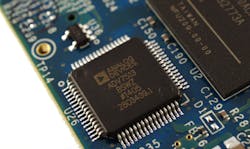For years, the semiconductor industry has been spreading its roots. Tiny integrated circuits are being used in everything from electric vehicles to smartphones and household devices to the factories that assemble them. But in spite of this appetite for chips, the industry is consolidating rapidly.
On Tuesday, that fact was underlined when Analog Devices said that it planned to buy analog chipmaker Linear Technology for $14.8 billion. The deal reflects the growing market for analog chips that handle real-world data flowing into the digital veins of electronic devices.
The transaction combines two of the biggest makers of analog and mixed-signal chips. These devices are typically used to convert physical data – like movement, sound, and video, as well as analog radio signals – into digital form. Both companies supply chips for millions of consumer and commercial products, including smartphones, cars, factory equipment, and cellular infrastructure.
Analog Devices is one of the major suppliers of data converters in the industry. On the other hand, Linear Technology has tended to design power management chips, while making amplifiers, interface chips, and data converters similar to Analog Devices. The overlap, Analog said, will help round out its product portfolio. The power management chips will help it address the Internet of Things, which will include cars and industrial equipment equipped with low-power sensors and wireless parts.
“This is the right combination at the right time in the evolution of our industry,” said Vincent Roche, Analog’s president and chief executive, in a conference call with financial analysts. “The two companies create a powerhouse in the analog world.”
Industry analysts said the deal might turn Analog into strong competition for Texas Instruments, the world’s biggest analog chipmaker. After the deal, the company will have yearly revenues of around $5 billion. That would be enough to become the second biggest supplier of analog chips by revenue, according Brian Matas, an analyst with IC Insights, a research firm that follows the analog industry.
Analog Devices, based in Norwood, Mass., was founded in 1965. It makes most of its revenue from industrial, automotive, and wireless infrastructure, as well as contracts with smartphone maker Apple. But company has lingered behind Infineon and Skyworks Solutions in analog revenues in recent years.
Known as an old-school engineering company, Linear Technology has kept a lower profile. The majority of its revenue stems from power management chips, amplifiers, and converters buried inside the circuitry of cars and factory equipment.
Bob Swanson, who helped found Linear in 1981 and serves as its executive chairman, has taken a skeptical approach to mergers and acquisitions. Swanson said that he was not looking to sell the company, which is known for pulling huge profit margins. But he was swayed by the financial and technical benefits of the deal.
“Often one plus one doesn’t even equal two,” he said in a conference call after the announcement. “However this combination is unique. It is probably the only merger in the analog world that has a chance of one and one exceeding two.”
The chip industry has been consolidating rapidly over the last two years, with acquisitions and mergers piling up like pencil shavings. Softbank, the Japanese firm that operates Sprint, recently said that it was buying mobile chipmaker ARM Holdings for $32 billion. Earlier this month, Infineon said that it was buying Cree's Wolfspeed division for a wide array of power and radio components.
Analog and mixed-signal companies have been the biggest targets in the industry’s compression. The cost and complexity of analog design has increased in recent years, and design cycles are typically longer than in digital. That could slow shifts into new industries, giving chipmakers an incentive to merge with competitors, said IC Insights' Matas.
Analog Devices employs around 9,000 people, while Linear Technology, based in Milpitas, Calif., employs about 4,865 worldwide. Neither company detailed plans for cutting jobs. Analog’s Roche noted that “there isn’t a great abundance of talent in this industry, so it’s our intention to make sure that we win the hearts and the minds of everybody.”
Roche will continue to serve as chief executive of Analog Devices. The companies said that their executive ranks would be a combination of both sides, but Swanson said he had not discussed what role he would have at the combined company.
Linear Technology will not exist as an independent division under Analog Devices, but the brand will be kept alive to sell power management products. In spite of that, Roche said that Linear will have a strong influence on developing new power chips.
“My expectation is that LTC will not only keep its brand in high-performance power but also take the lead in driving the process roadmaps and products,” he said.
About the Author
James Morra
Senior Editor
James Morra is the senior editor for Electronic Design, covering the semiconductor industry and new technology trends, with a focus on power electronics and power management. He also reports on the business behind electrical engineering, including the electronics supply chain. He joined Electronic Design in 2015 and is based in Chicago, Illinois.


